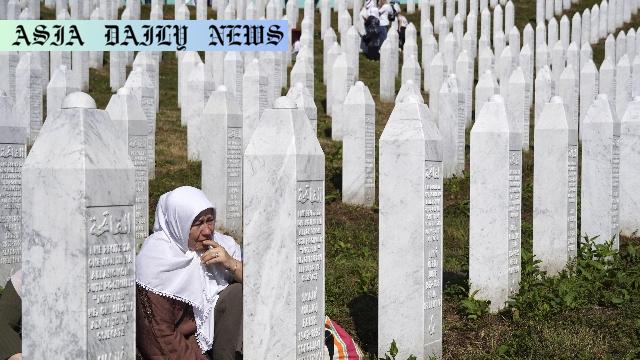Srebrenica massacre: The 30th anniversary commemorates the tragic loss of more than 8,000 lives during Europe’s worst atrocity since WWII.
Srebrenica massacre marked as Europe’s worst atrocity since WWII.
Over 8,000 Bosnian Muslims were killed in July 1995 during ethnic conflict in Yugoslavia.
A UN tribunal sentenced the commander of the armed forces to life imprisonment.
Commemorations included ceremonies in Bosnia and The Hague, unveiling a new monument.
Experts stress accountability for war crimes and draw comparisons to conflicts in Ukraine and Palestine.

The Srebrenica Massacre: A Tragedy That Shook Europe
On the 30th anniversary of the Srebrenica massacre, the world remembers the grim chapter that took place in July 1995. Described as Europe’s worst atrocity since World War II, the event saw Bosnian Serb forces overrun the Bosnian town of Srebrenica, then declared a United Nations safe zone. Over 8,000 Bosnian Muslim men and boys who sought refuge there were executed in a chilling act of genocide. Occurring amidst the disintegration of Yugoslavia, this massacre underscores the devastating consequences of unbridled nationalism and ethnic tensions.
This tragic event unfolded in the broader context of the Bosnian War, a multi-ethnic conflict characterized by widespread atrocities and displacement. The killings at Srebrenica, recognized as genocide by multiple international courts, not only brought widespread grief but also prompted critical reflection on the international community’s role in preventing and responding to such crimes. The negligence witnessed during the massacre called for stronger mechanisms in peacekeeping and accountability.
The Role of International Justice
The massacre’s aftermath saw the establishment of the International Criminal Tribunal for the former Yugoslavia (ICTY)—a pioneering mechanism aimed at holding perpetrators accountable. The tribunal tried several high-profile figures, including Ratko Mladić, the commander of the Bosnian Serb forces, who eventually received a life sentence. The ICTY was instrumental in setting precedents for prosecuting war crimes, paving the way for the creation of the International Criminal Court (ICC).
Professor Kubo Keiichi of Waseda University highlighted the importance of unyielding international pressure in such cases. Initially defiant, the political and military leaders of the Bosnian Serbs were eventually compelled to face justice, emphasizing the power of global resolve against impunity. Lessons from the Srebrenica massacre continue to guide the international community’s stance on accountability, as seen in recent ICC actions, such as issuing arrest warrants against those accused of war crimes in Ukraine and Palestine.
Commemorating the Victims and Learning Lessons
Commemorations marking this somber anniversary were held in Bosnia-Herzegovina, attracting survivors, global leaders, and members of the international community. A parallel ceremony was conducted in The Hague, the former home of the ICTY. A new monument was unveiled, serving as a permanent reminder of the atrocities committed and the importance of standing against hatred and violence.
One attendee at the commemoration noted the relevance of remembering and acting on lessons from the past, particularly in today’s turbulent world. Conflicts and human rights abuses in regions like Ukraine and Palestine echo the need for a continued commitment to justice. The collective memory of Srebrenica reinforces the call to say a resolute “no” to war crimes and to persist in pushing for accountability on the global stage.
Conclusion: A Call for Collective Responsibility
The Srebrenica massacre serves as a chilling reminder of the consequences of unchecked aggression and the importance of vigilance in safeguarding human rights. The actions of the international community—though delayed—demonstrated that justice, though slow, can and must prevail. The events of 1995 have left an indelible impact not only on survivors and the families of victims but also on global governance, emphasizing the value of international cooperation.
As the world reflects on the 30th anniversary of this dark episode, it must also confront present-day challenges with the lessons firmly in mind. By remembering Srebrenica, the international community reaffirms its commitment to justice, reconciliation, and the prevention of future atrocities.



Commentary
Reflections on the Legacy of the Srebrenica Massacre
The 30th anniversary of the Srebrenica massacre is more than a solemn commemoration of one of Europe’s darkest chapters—it is a call to action. The tragedy serves as a stark reminder of the devastating consequences of silence and inaction in the face of mounting atrocities. For those who experienced the horrors firsthand, the scars linger, and for the global community, the lessons remain as pertinent as ever.
The resilience of survivors and their unwavering demand for justice is a powerful testament to the human spirit. It is crucial for the international community not only to honor the memory of the victims but also to take meaningful steps to ensure that future generations are spared similar tragedies. This anniversary should serve as an opportunity to strengthen global norms around conflict resolution, reconciliation, and justice.
Drawing Parallels and Focusing on Accountability
Historical crimes like the Srebrenica massacre find troubling parallels in contemporary conflicts worldwide. Whether in Ukraine, Palestine, or other zones of violence, the failure to protect vulnerable populations continues to challenge the international community. Holding perpetrators of war crimes accountable sends a clear message against impunity. Mechanisms such as the International Criminal Court exist precisely for these situations, and they must be empowered to act decisively.
Moving Forward with Unity and Justice
The newly unveiled monument in The Hague reminds us that remembrance is an act of resistance against forgetting. Collective memory plays a critical role in preventing future atrocities. By keeping the memory of Srebrenica alive, we not only honor the victims but also reaffirm the global commitment to human rights and dignity.
Ultimately, the world must stand united against hatred, bigotry, and violence. The lessons of Srebrenica should push us toward creating a more just and compassionate world, where such tragedies become relics of a painful but distant past.